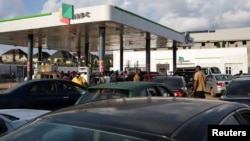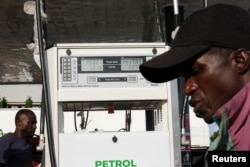Barely 48 hours after Nigeria's state-owned oil company made a startling revelation, hundreds of commuters joined a line stretching many kilometers for fuel at an NNPC outlet in the capital.
In a statement Sunday, Nigeria’s state oil firm, NNPC Limited, said that financial constraints are hampering its ability to import gasoline.
The statement acknowledged local media reports in July that the oil regulator owed oil traders more than $6 billion — double its debt compared with April.
Nigeria depends on imports to meet its daily demand for gasoline — more than 66 million liters — and NNPC is the sole importer of fuel.
Abuja resident John Prince said he'd been waiting in line for hours.
"When I came in the morning, they were not selling [gasoline]. They said they were waiting for orders from above. [Now] I've been here for the past two hours,” he said.
Prince said that while customers waited, the gasoline station increased prices by nearly 30%.
NNPC said the situation could worsen supply in coming days but also said it is working with the government and other partners to fix the problem.
Fuel shortages have been recurring in Nigeria since last year, despite Nigerian President Bola Tinubu scrapping the fuel subsidy.
Tinubu doubles as petroleum minister, but authorities later reinstated a partial subsidy to curb inflation, the high cost of living and growing public tensions triggered by economic reforms.
But the founder of the Center for Transparency Advocacy, Faith Nwadishi, said corruption and incompetence are to blame.
"It's just a cocktail of corruption, impunity and no regard for the people of the country,” she said. “I think it's just another ploy to make Nigerians pay for impunity. It's quite disheartening. This morning, I had to queue so that I could get fuel to come out. You know — man hours lost, no productivity, and nobody is making any compensation for that. It's unfortunate.”
Last month, NNPC announced a record $1.9 billion in profits for 2023 but said it was covering for shortfalls in the government's petrol import bill.
Ogho Okiti, an economic analyst, said, "Every other oil-producing country is smiling now except Nigeria. So, it's a transparency problem. There's so much uncertainty. And that heightened uncertainty and volatility will continue to drive the price and, of course, drive the conditions that we see.
“As it is, we're losing in all ramifications — we're paying exorbitant prices for fuel, the government is not getting the resources, and the exchange rate is worsening," Okiti said.
Meanwhile, authorities say the Dangote Oil Refinery in the Lagos area has begun gasoline production and could supply up to 25 million liters this month.
On Tuesday, the Nigerian Midstream and Downstream Petroleum Regulatory Authority entered an agreement with the NNPC to sell crude oil to Dangote refinery in the local currency, the naira.
If that happens, it could significantly address local supply issues and save the country several billions of dollars in foreign exchange.





